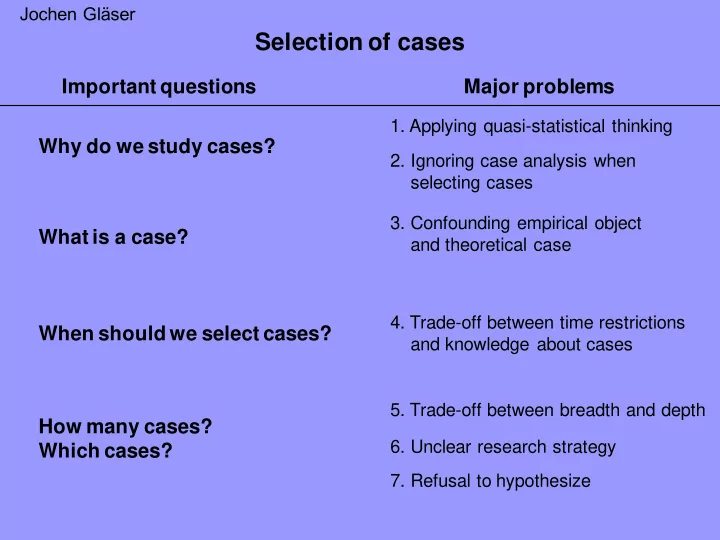

Jochen Gläser Selection of cases Important questions Major problems 1. Applying quasi-statistical thinking Why do we study cases? 2. Ignoring case analysis when selecting cases 3. Confounding empirical object What is a case? and theoretical case 4. Trade-off between time restrictions When should we select cases? and knowledge about cases 5. Trade-off between breadth and depth How many cases? 6. Unclear research strategy Which cases? 7. Refusal to hypothesize
Why do we study cases? [Discussion limited to multiple-case studies. [Distinctions like testing theory - creating theory are useless] See e.g. Siggelkow 2007 on the uses of single-case studies.] Two approaches to case studies in the literature: 1) Intensive study of a small number of cases in order to shed light on a population. „Weak approximation of the statistical method“ Representativeness of cases remains central concern 2) Intensive study of a small number of cases in order to explain a specific social phenomenon. Theory development by (predominantly) qualitative research Generalization on the basis of a match to the underlying theory rather than a larger universe
Why do we study cases? Description Explanation Causal Causal Exploratory Implicit relationships mechanisms Initial conditions Causes Thick Description Sequence of and of variation description causally linked effects events Outcomes How has NPM What conditions To what extent has been adopted by enable, promote, How is NPM NPM permeated adopted? two Technical prevent, or hinder the German universities? Universities? adoption of NPM?
What is a case? Case: Social phenomenon (event, process, constellation of actors) that can be analytically separated from its environment. Empirical object or theoretical construct? It is impossible to use empirical objects as cases. 1) We cannot dismiss our social scientific perspective. 2) All empirical analysis is selective. 3) Our decisions about the boundaries of our case are based on theory. [We routinely use names of empirical objects as labels for cases.]
When should we select cases? Two ways to go about this All at once Select as you go case selection case selection data collection data collection data analysis data analysis Advantages Adaptation of case Efficient, consistent selection to new insights Disadvantages Time-consuming, first Insufficient a priori - results may distort the knowledge about cases investigation may distort investigation
How many cases? Which cases? The universe of case selection strategies and its black hole Major problem: Trade-off between breadth and depth Confirming and disconfirming cases Maximum variation Extreme or deviant case Intense case Convenience Criterion Typical case Opportunistic Stratified purposeful Which strategy for which Snowball or chain research question? Random purposeful Theory-based Politically important cases Homogenous Critical (crucial) case
How many cases? Which cases? Theoretical and practical considerations Theoretical considerations: Practical considerations: Number of cases that can be studied Importance of variation External audiences that Degree of variation needed must be kept happy Access to empirical objects Depend on Depend on 1. Maturity of theory 1. Resources 2. Research strategy 2. Conditions of funding (Description? Which kind of explanation?) 3. Empirical methods, 3. Assumptions about cases empirical objects
How many cases? Which cases? Research strategy and variation Description Explanation Causal Causal Exploratory Implicit mechanisms relationships What should vary between cases? At least At least independent and All relevant independent and irrelevant intervening variables* intervening variables variables Why? Few cases, Causality is Causality is Representativeness typical cases, established from established from crucial cases covariation process-tracing *See Lieberson 1992
Questions for group sessions How are cases defined in the project? What constitutes a case? Which empirical entities correspond to these cases? Which variables should vary between cases, which should not? How can information about these variables be collected for all possible cases? What role do pragmatic criteria play (ease of access to empirical objects, costs …)? How can ‘cases’ be best accessed and co -operation be gained?
Recommend
More recommend